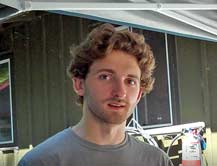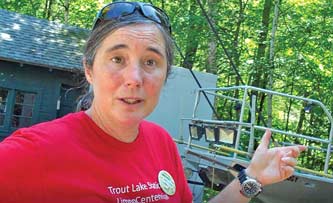August 9, 2024 at 5:45 a.m.
Trout Lake Station celebrates 100 years with special open house
Each year, Trout Lake Station in Boulder Junction holds an open house. The open house gives grad students and undergrads a chance to talk with the public about all of the research they have been working on over the course of the field season. This year’s open house was extra special, however, as it also marked the 100th year of research at Trout Lake Station.
100 years of research
Trout Lake Station executive director Gretchen Gerrish said the celebration started earlier this year when 140 alumni, whose work spanned eight decades. Their work included everything from lake ecologists to fisheries biologists to partnerships with the Department of Natural Resources (DNR), the Lac du Flambeau Tribe and lake groups, she said.
 Mason Polencheck is studying mud puppies in Wisconsin. There has been no study of this declining species since the 1980s.
Mason Polencheck is studying mud puppies in Wisconsin. There has been no study of this declining species since the 1980s.(Photo by Beckie Gaskill/Lakeland Times)
“Those folks all came together to reminisce on the last hundred years, but also to reflect on what’s coming in the next one hundred years,” Gerrish said.
The group gathered at the community center in Boulder Junction to begin the event, before heading to the original site of Trout Lake Station. The original cabins at Trout Lake Station were on the north side of the South Bay of Trout Lake. When the land where the station now sits was purchased from the Chippewa Lumber Company, the original cabins were slid across the lake in the winter to the current Trout Lake Station property.
“What I think is really incredible is how many people got their start here, built there research careers here, then went out to within the DNR or other academic units or private industry, and they all came back together to put it all together,” Gerrish said. Every year, she said, approximately 100 water-related topics are put out to the community.
Open house
The open house event usually draws between 200 and 400 people, who all come to see what the students are working on in the way of water-related studies in the area. The research leaders are on hand to answer questions, and many of the stations have activities available for kids and adults alike to test their knowledge and just have fun learning.
Trout Lake Station is also building a 3,600 square foot heated research building. The building will include a mechanic’s garage, active gear storage and a large makers’ space that will be used for the creation of large buoys the station will be putting out on area lakes to gather data.
Research
One of the research projects that has been ongoing at Trout Lake Station is a project of Jack Abel, an undergrad at Minnesota State, graduate student Jeston Hassler of South Dakota State and UW-Stevens Point undergrad Olyvia Halbach. They are looking at the pelagic food web in their test lakes. Previously, nonnative rainbow smelt have been removed from lakes and replaced with native cisco, Hassler said. Now the students are monitoring lakes to see if the cisco are re-establishing in those lakes. Hassler said it is too early to tell if this is making a change in those food webs, but Joe Mrnak, who is leading the project, did find a cicso recruit two years ago. The project started in 2019 and it is slotted to continue to 2029, Mrnak said.
 Trout Lake Station director Gretchen Gerrish was excited to see the 100th anniversary of Trout Lake Station and to have students share their research projects at the recent open house at Trout Lake. (Photo by Beckie Gaskill/Lakeland Times)
Trout Lake Station director Gretchen Gerrish was excited to see the 100th anniversary of Trout Lake Station and to have students share their research projects at the recent open house at Trout Lake. (Photo by Beckie Gaskill/Lakeland Times)Miran Danz and Sagen Quale are looking at wild rice in six different lakes. Some have a dense wild rice population and some with a sparse population. The hope is to find out what is the cause or causes of the wild rice decline in some lakes in ceded territory.
The research team is conducting a comprehensive study on each lake, focusing on 21 specific points. They collect a wide range of data, including water level, temperature and dissolved oxygen levels, in addition to performing seed bank sampling. According to Danz, many of the populations experiencing a decline are located near floating leaf vegetation, particularly water lilies. The team has also observed high rates of water flow and herbivory in these areas.
Quale said the key might be to fostering a mutual respect between the water and those who live around it. Things such as drawing back on recreational activities where wild rice is present may help the situation. This is key in the beginning stages of wild rice growth, she said, as it is very sensitive at its floating leaf stage. Waves from large boats as well as flooding conditions in spring from heavy rains are all factors that work against wild rice production, she said.
Danny Szydlowski’s research project is a whole lake experiment at Notre Dame’s property where they are adding nutrients to two different lakes. Dye is also added to one of those lakes. The hypothesis is, by adding that dye to the lake, they will be able to increase the resilience of the lake to algal blooms by blocking out some of that light. His newest iteration of this research just started last spring and he is using several new tools to assess the resilience of those lakes where the dye has been added.
Mason Polencheck has been researching mud puppies, which are declining in Wisconsin as well as in other states. He said there has not been a study on mud puppies since the 1980s. He is attempting to learn more about them in general as well as a certain fungus that is detrimental to all amphibians. The study started about a year-and-a-half ago, and he will be finishing up the field work this next month and completing all of the analysis.
He has so far found that every mud puppy he has encountered has the fungus he spoke of, but none of them have the actual disease that could kill them. Polencheck said he is interested in why that is, whether it is physiological, or whether the microbes on the skin of the mud puppies are preventing them from getting sick. It could still be possible, he said, that mud puppies could be passing this disease on to other amphibians that live in the same waters where mud puppies are found.
One of the other ongoing studies was the Bright Spots Project. This project looks at lakes where walleye are doing well, even through climate change. Quinn Smith and Jack Abel are both part of the Bright Spots team at Trout Lake Station. They are interested in fisheries that are doing better than expected with climate change, Smith said. They use a variety of aspects of lake ecosystems, including environmental variables. The team uses high tech sensors to measure water temperature, light and oxygen. They can deploy those sensors throughout the lake at various depths and in various places. This allows them to look not only at seasonal changes, but how things may be changing spatially.
Looking ahead 50-100 years, Smith said, the information gathered now could give managers an idea of how those lakes will need to be managed at that time. This project, he said, is not just a UW-Madison project. The team works with different teams in different places, including University of Minnesota Twin Cities as well as the Great Lakes Indian Fish and Wildlife Commission. The project has funding out to four or five years, he said, and will wrap up at that time, but they will continue to look at different lakes during that time and find those Bright Spots lakes.
Beckie Gaskill may be reached via email at [email protected].



Comments:
You must login to comment.